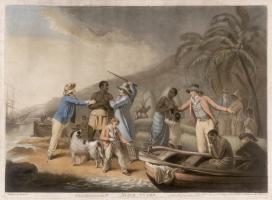In Greater Manchester
- How money from slavery made Greater Manchester
- The importance of cotton in north west England
- The Lancashire cotton famine
- Smoking, drinking and the British sweet tooth
- Black presence in Britain and north west England
- Resistance and campaigns for abolition
- The bicentenary of British abolition
Global

The Slave Trade
Africa, the arrival of Europeans and the transatlantic slave trade
Africa has a long history of trading with Europe, including a very important commercial trade in textiles which expanded during the transatlantic slave trade. However, profits were made at the expense of people.
The Portuguese first explored the west coast of Africa trading largely in gold. They began the transatlantic slave trade when they exported 235 Africans from present day Senegal in 1444. The British joined in the trade in African people with John Hawkins’ expeditions from 1564.
Systems of slavery had existed in Africa (and throughout the world) before the transatlantic slave trade. However, the scale and the inhumanity of the European exploitation of Africa were unique. Best estimates by historians suggest 12 million Africans were forcibly transported from their homes across the Atlantic (although the figures may be much more). Many millions died in the process of being captured and transported. Enslaved Africans were treated as ‘chattels’ (possessions). They had no rights and their children were automatically born into slavery.
There is clear evidence of very sophisticated African cultures from many thousands of years ago as shown by the Egyptians. There were many other powerful kingdoms and centres of learning throughout Africa over many centuries, including the kingdoms of Mali, Songhay, Benin and the Asante, all built on wealth from mining gold. In spite of the evidence, Europeans justified enslaving African people by describing them as ‘savages’, ‘uncivilised’ and even ‘subhuman’.
European greed led to the over exploitation of Africa's natural resources. Its people were enslaved and subjected to unspeakable cruelty. They were regularly chained, punished with whips and branding irons and women were often raped.
These harsh conditions continued in the plantation economies in the Caribbean and the Americas. Enslaved Africans laboured to produce highly profitable commodities such as sugar, tobacco and cotton which were exported to Europe. The transatlantic trade was economically efficient for Europeans who made vast amounts of money, but it was brutal and inhumane to millions of African people.